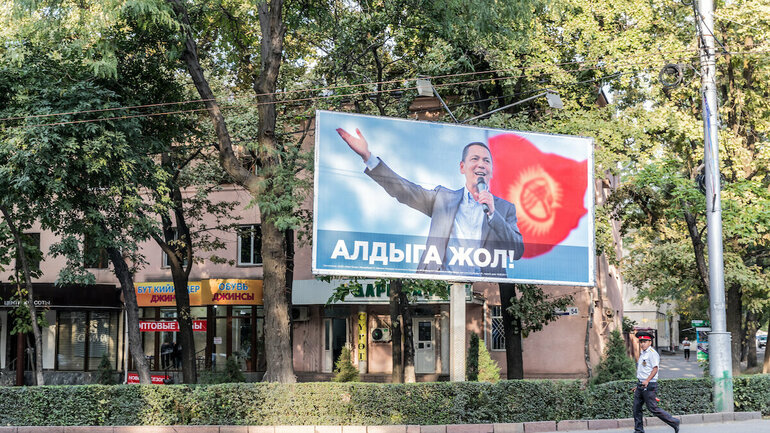Kyrgyzstan’s presidential election

Since gaining independence in the early 1990s, the small, mountainous Central Asian republic of Kyrgyzstan has earned and retained a reputation as a democratic state, an ‘island of democracy’. This label applies especially in the political context of the other Central Asian successor states to the Soviet Union, where authoritarian leaders have striven to exercise as much power as possible for as long as possible through undemocratic means. By contrast, the Kyrgyz Republic has so far had four presidents chosen by the people. There are over 100 political parties, several of which have always been represented in the parliament and have often defied the government of the day. And when it comes to criticising their leaders, the Kyrgyz do not hold back. However, two previous presidents were installed not through elections but through so-called revolutions. Several constitutions and countless constitutional amendments are symptomatic of the country’s ongoing search for the most suitable distribution of power between president, prime minister, and parliament. Equally, the total of thirty prime ministers in twenty-six years of independence can only be seen as an indication of a lack of political stability. The most recent presidential election on 15 October confirms this trend.
A democratic transfer of power
This election passed off as any regular vote. In accordance with the constitution, the incumbent elected in 2011, Almazbek Atambayev, was not allowed to stand for re-election, and he respected the law. As in previous presidential elections, an astonishingly high number of people expressed their interest in standing—a total of 59 individuals. After some had some had withdrawn and after the usual check if candidates met the legal requirements, they were finally whittled down to eleven candidates. The more than 3 million voters therefore had a real choice, even though political platforms and programmes play practically no role in Kyrgyzstan. In the run-up to election day, there were reports of attempted vote buying in the south of the country, and in its latest report the OSCE/ODIHR mission cited problems concerning the secrecy of ballots and the counting of votes. Yet the result itself was not called into question. The election winner, with 54.2 per cent of the vote, was the former social democratic prime minister Sooronbay Jeenbekov. The fact that this result surprised many observers shows again that the political situation in Kyrgyzstan differs from that in the country’s neighbours, where winners are often known in advance. The second-placed candidate, Ömürbek Babanov, criticised the conduct of the electoral campaign but recognised the result and placated his unsatisfied supporters. It is therefore highly likely that on 24 November for the first time in Kyrgyzstan a president chosen by the people in accordance with the constitution will hand over power to an equally democratically elected successor. And so, the country will again do justice to its reputation as a trailblazer of democracy in Central Asia.
A destabilizing campaign
However, the election campaign placed uneasy strains on the country’s short-term future. Since the start of the year, and especially in recent weeks before the vote, the style and tone of political debate have taken on an alarmingly polarising form that endangers the internal and external stability of the country. This began with the arrest in the spring of an influential politician, Ömürbek Tekebayev, and his sentencing in August to eight years’ imprisonment for corruption. It continued with the legal persecution of critical media outlets and journalists and culminated in the detention on 30 September of the member of parliament Kanatbek Isayev, one of Babanov’s supporters. He was suspected of planning to cause disturbances if Babanov was not elected.
As it became clearer that the election would come down to a competition between Jeenbekov and the wealthy businessman and initial favourite Babanov, the tone between the two sides intensified. Personally discrediting the other candidate became the most important means of conducting an increasingly unfair electoral contest. The fifty-eight-year-old Jeenbekov was seen as a confidant—for some, a protégé or a puppet—of the incumbent president Atambayev. As such, he received support in the form of ‘administrative resources’, such as pressure on civil servants and students, to vote for the candidate of power and to produce one-sided coverage in state media.
The incumbent president Atambayev clearly saw his role less and less as a neutral head of state, instead giving unmistakable backing to ‘his’ candidate Jeenbekov. What was particularly alarming is that in doing so, he strained Kyrgyzstan’s bilateral relationship with Kazakhstan. Electoral campaign statements by Atambayev in October brought the previously friendly relationship between the two states down to an entirely unnecessary low. The altercation was triggered in mid-September, when, during the official campaign in Kyrgyzstan, Kazakh president Nursultan Nazarbayev received Babanov. Kyrgyz protests against meddling in the country’s internal affairs were met with denials from Astana, leading Atambayev to declare that Kazakhstan was ruled by corrupt sultans who were plundering the country. In return, Kazakhstan decided not to send any election observers to Kyrgyzstan and stepped up controls on the two countries’ common border, leading to queues of several hours at the frontier. Kyrgyzstan, for its part, cancelled previously agreed Kazakh remittance payments.
Jeenbekov, who with 54.2 per cent of the vote achieved the lowest result to date in a presidential election in Kyrgyzstan, must now sweep away the internal and external political shards of the electoral campaign before he can dedicate himself to solving Kyrgyzstan’s real—and considerable—problems. The election is yet another example that Kyrgyzstan aims to act in compliance with the country’s written democratic norms, but that the implementation of those rules is a long way off the mark, which indicates democratic deficits and may endanger both internal and external stability. The West’s praise for the state of democracy in Kyrgyzstan is still based above all else on a comparison with the country’s authoritarian neighbours. The search for the right political way forward must continue.
Beate Eschment is a research associate at ZOiS. She is currently the editor of the Zentralasien-Analysen.